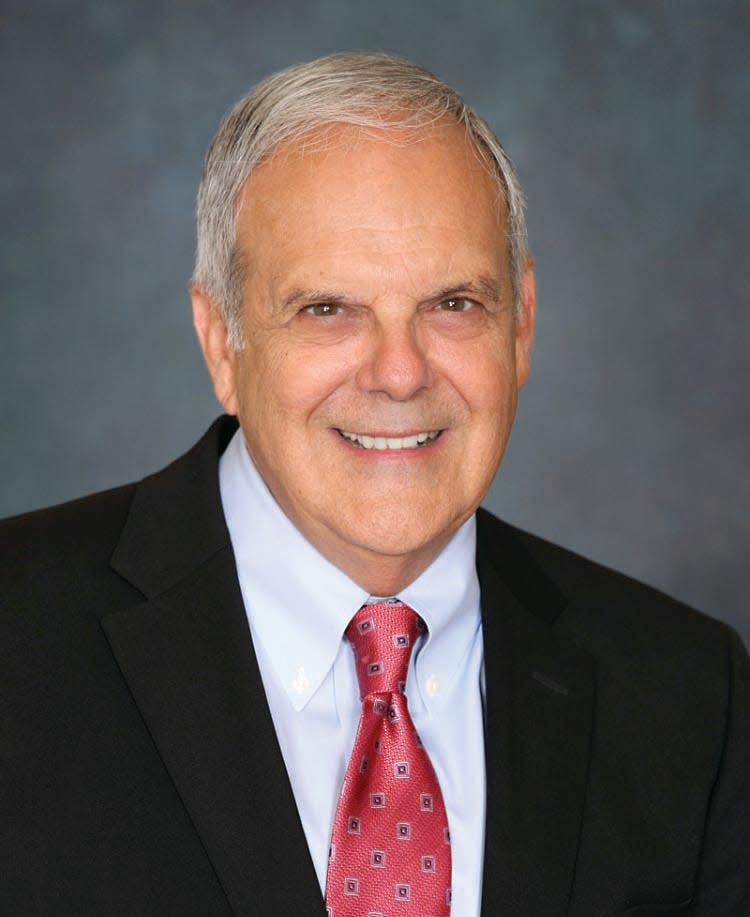Column: Free speech
- Oops!Something went wrong.Please try again later.
When Albert Einstein unveiled his formula, E=mc2, did he ever think it would lead to the doomsdayers among us waiting nervously to see if Putin would be putting his finger on the button ensuring mutual destruction of the world?

Dr. Einstein was not just a violin playing physicist. He was a Nobel laureate, and his formula was the first time the mass of an object was connected with its energy. It resulted in the creation of an entirely new world of physics. This formula is the most famous equation ever in the entire history of famous equations.
He developed this idea in 1905. According to Alok Jha in The Guardian, it had emanated from another of Einstein’s theories on relativity. “…a radical new way to relate the motions of objects in the universe.”
But to answer my original Einstein question, Jha theorized that beyond making scientists and military leaders realize that such a thing would be theoretically possible, it’s unlikely that Einstein’s equation was much use in designing the bomb.
This brings me to the next question. When the Internet was invented was it seen as a way to open access to all human knowledge or a way to unleash unregulated platforms for politics and previously hidden, forbidden and incomparable vitriol.
Do you think that was part of the plan that had been laid out by Twitter, Facebook, Instagram, and any number of other platforms? Or was it like E=mc2, a new idea with unexpected consequences that evolved from its untapped potential without well-defined boundaries relating to community standards? How, for example has it altered freedom of speech?
The challenge becomes one of censorship vs. destruction of the guard rails of our society and our culture. With Elon Musk’s attempt to own Twitter, there are numerous additional questions regarding freedom of speech and the potential ramifications emanating from whatever decisions are made in the future regarding Twitter’s flexibility. A Chronicle of Higher Education article by Tom Bartlett questioned just exactly what was going on with free speech at Yale Law School. According to Bartlett, about 100 irate students banged on walls, shouted slogans, and extended their middle fingers during a protest directed toward Kristen Waggoner, general counsel of the Alliance Defending Freedom. This is an organization that claims to be the largest legal organization devoted to “religious freedom, free speech, and sanctity of life,” yet their website shows they are opposed to gay marriage, abortion, and transgender women participating in sports.
Although the dean of Yale’s Law School has come under intense criticism by graduates and organizations like the Federalist Society, she maintains her job is to “listen to both conservative and progressive factions, decide whether course corrections are needed, and ensure that the institution stays true to its core mission.” But she also maintains “free speech and engaging different viewpoints” is her ultimate goal.
Last night I watched a comedy special by an older, Caucasian comedian, and didn’t laugh much. In an article in Time, Judy Berman identified the audience’s response as clapter, a term used by Seth Meyers, Tina Faye, and others to describe clapping and laughing in order to be on the right side of history.
She went on to say that it was “recently catalyzed by a fiery debate surrounding free speech, hate speech, and cancel culture, and has metastasized into something more corrosive — something that goes beyond the actual substance of comedy’s much-discussed woke words. Comedians have defaulted to binary ideas about right and wrong . . . and that impacts voices on all sides of these issues.” In fact, her article is titled, “Comedians Obsession With Their Haters Is Ruining Comedy.”
Maybe, like Einstein’s theory of relativity, the internet has devolved into something so toxic, so ruinous, so hurtful that we are not only inching the doomsday clock forward, but we’re also taking the laughter out of humanness. Clearly, the line between totally free and community standards free speech is still undefined?
This article originally appeared on The Daily American: Nick Jacobs column about free speech

